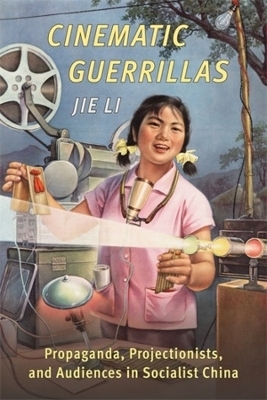
Cinematic Guerrillas
Columbia University Press (Verlag)
978-0-231-20627-3 (ISBN)
How might cinema make revolution and mobilize the masses? In socialist China, the film exhibition network expanded from fewer than six hundred movie theaters to more than a hundred thousand mobile film projectionist teams. Holding screenings in improvised open-air spaces in rural areas lacking electricity, these roving projectionists brought not only films but also power generators, loudspeakers, slideshows, posters, live performances, and mass ritual participation, amplifying the era’s utopian dreams and violent upheavals.
Cinematic Guerrillas is a media history of Chinese film exhibition and reception that offers fresh insights into the powers and limits of propaganda. Drawing on a wealth of archives, memoirs, interviews, and ethnographic fieldwork, Jie Li examines the media networks and environments, discourses and practices, experiences and memories of film projectionists and their grassroots audiences from the 1940s to the 1980s. She considers the ideology and practice of “cinematic guerrillas”—at once denoting onscreen militants, off-the-grid movie teams, and unruly moviegoers—bridging Maoist iconography, the experiences of projectionists, and popular participation and resistance. Li reconceptualizes socialist media practices as “revolutionary spirit mediumship” that aimed to turn audiences into congregations, contribute to the Mao cult, convert skeptics of revolutionary miracles, and exorcize class enemies.
Cinematic Guerrillas considers cinema’s meanings for revolution and nation building; successive generations of projectionists; workers, peasants, and soldiers; women and ethnic minorities; and national leaders, local cadres, and cultural censors. By reading diverse, vivid, and often surprising accounts of moviegoing, Li excavates Chinese media theories that provide a critical new perspective on world cinema.
Jie Li is professor of East Asian languages and civilizations at Harvard University. Her books include Shanghai Homes: Palimpsests of Private Life (Columbia, 2014), Red Legacies in China: Cultural Afterlives of the Communist Revolution (2016), and Utopian Ruins: A Memorial Museum of the Mao Era (2020).
Acknowledgments
Introduction: Revolutionary Spirit Mediumship
Part I: Projectionists as Media Infrastructure
1. Cinematic Nation-Building: Media Networks and Spiritual Battlegrounds
2. Mobile Projectionists and the Things They Carried
3. The Three Sisters Movie Team: Projecting Models, Model Projectionists, and Female Projectionists
4. The Cost of Spiritual Food: A Ritual Economy of Rural Cinema
Part II: Audiences as Creative Agents
5. The Hot Noise of Open-Air Cinema
6. Guerrilla Cinema and Guerrilla Reception
7. Transcultural Guerrillas: The Reception of Foreign Films in Socialist China
8. Poisonous Weeds and Censorship as Exorcism
Epilogue
Appendix: Interviews
Notes
Index
| Erscheinungsdatum | 23.11.2023 |
|---|---|
| Zusatzinfo | 44 b&w figures |
| Verlagsort | New York |
| Sprache | englisch |
| Maße | 152 x 229 mm |
| Themenwelt | Kunst / Musik / Theater ► Film / TV |
| Geisteswissenschaften ► Geschichte ► Regional- / Ländergeschichte | |
| Sozialwissenschaften ► Kommunikation / Medien ► Medienwissenschaft | |
| Sozialwissenschaften ► Politik / Verwaltung ► Politische Systeme | |
| Sozialwissenschaften ► Politik / Verwaltung ► Politische Theorie | |
| ISBN-10 | 0-231-20627-5 / 0231206275 |
| ISBN-13 | 978-0-231-20627-3 / 9780231206273 |
| Zustand | Neuware |
| Haben Sie eine Frage zum Produkt? |
aus dem Bereich


